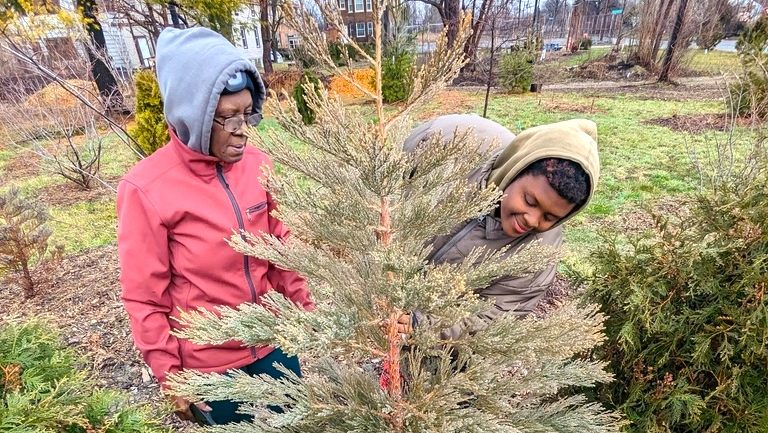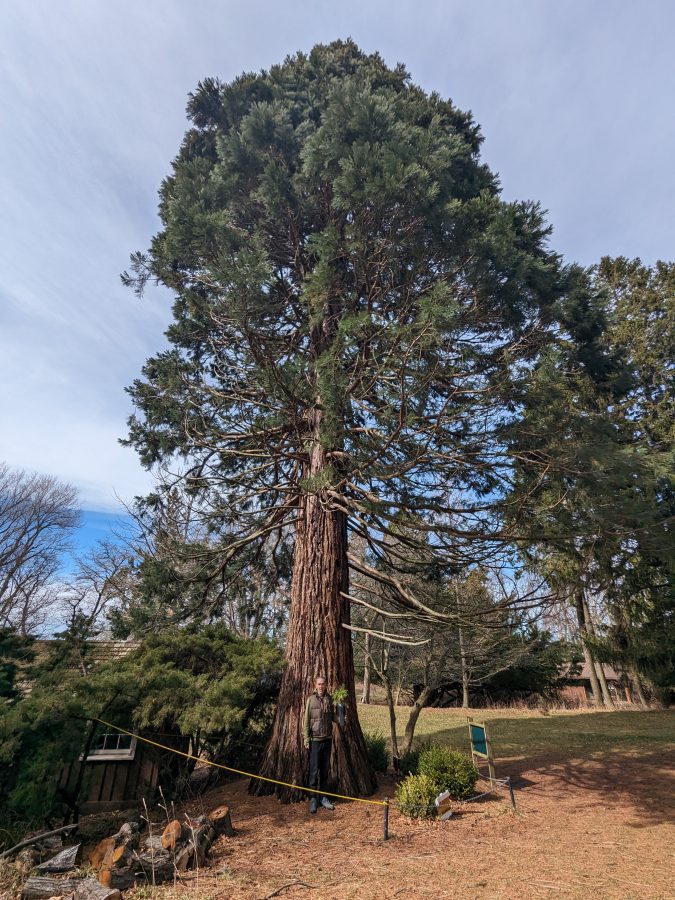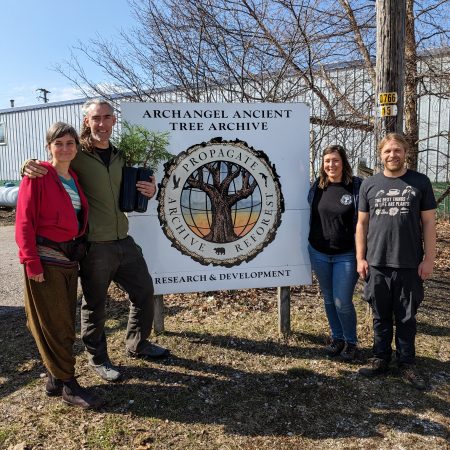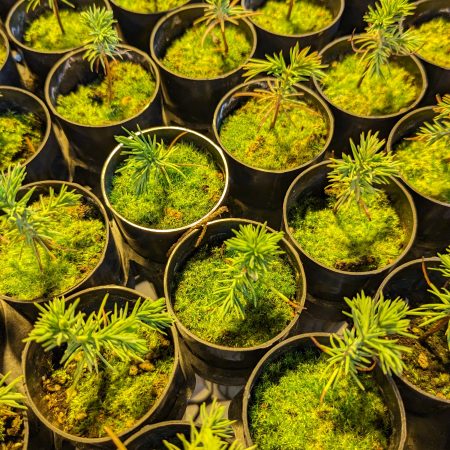Local nonprofit aims to plant Detroit’s first-ever forest of giant sequoia trees
Though native to the Sierra Nevada mountain range in California, sequoia trees have been planted all over the world — including right here in Michigan.

Volunteer Pamela McGhee (left) and her daughter, Arboretum Detroit employee Robyn Redding, stand next to a six-year-old sequoia tree in "Treetroit 2," a small tree park created by the arboretum in Detroit's Poletown East neighborhood.
A nonprofit in Detroit’s Poletown east neighborhood is partnering with an organization in northern Michigan to plant Detroit’s first ever forest of giant sequoia trees.
Sequoias are among some of the oldest tree species in the world — with the ability to live up to 3,000 years old. As a drought-resistant, major absorber of carbon dioxide, giant sequoias are extremely beneficial for helping to mitigate climate change.
“Giant sequoias are very fast growing, and have the potential to capture 10 times the carbon of your average tree,” said Birch Kemp, co-founder and executive director of Arboretum Detroit.
That is one of the main reasons why Kemp was inspired to build a sequoia forest in his Poletown East neighborhood, which has suffered from decades of pollution from industrial operations in the area.
“We’re trying to make up for a lot of high carbon activities and a lot of pollution that’s in our immediate neighborhood,” he said. “We have the space and the need — considering our environmental justice history — and with the neglect that our neighborhood has faced, and the pollution load that we face with the freeways and the waste industry, we really need vegetative buffers.”
Though native to the Sierra Nevada mountain range in California, sequoia trees have been planted all over the world — including right here in Michigan.

“They’re a super versatile tree,” Kemp said. “And there are a lot in Detroit right now. We have 20 in our neighborhood that are about six years old, and they’re doing great.”
Those trees — planted in collaboration with Arboretum Detroit — were donated by David Milarch from the Archangel Ancient Tree Archive, a nonprofit in Manistee County that propagates some of the world’s largest trees.

Kemp says Arboretum Detroit has maintained a relationship with Milarch over the years, occasionally kicking around the idea of creating a forest of sequoias in Detroit.
This year, the idea is finally coming to fruition.
“[Milarch has] helped plant giant sequoia forests in Long Island and in California and other places in the world. And he’s like: ‘Why am I not doing this in Detroit, where I’m from?’ And so he got really inspired this year,” Kemp said.

Next thing they knew, Kemp said, they were driving back from Copemish, Michigan — where Archangel is based — with 100 sequoia saplings in tow.
“He wanted to squeeze 200 in there, but we were just driving a little Subaru Outback,” Kemp said.
Those trees will be planted in Arboretum Detroit’s nursery, where they will live for the next six months to a year, depending on how long it takes to secure the land for the forest.
Kemp says for 100 trees, they are looking for a space that is about two to three acres, which would not be a problem in Poletown East.
“There’s plenty of space in our neighborhood,” Kemp said. “As you know, Detroit is full of vacant and neglected land. So that’s not a problem. It’s just the process of acquiring [the] land [and] the funds.”
The trees will be planted alongside native trees and other understory trees and meadow plants, Kemp said, so the forest is not a monoculture.
“A lot of people are gonna say it’s not a native tree. We don’t want it, you don’t know what you’re doing, they don’t belong here,” he said. “But the fact is, like David would tell you, we’re saving these trees…So on one hand, it’s preservation of those genetics. It’s also working with the climate as we know it now, right? We need trees that will be resilient and want to be here.”
In addition to the many environmental benefits a giant sequoia forest in Detroit can bring, Kemp — a former educator — hopes it can also offer educational opportunities for residents to learn more about climate resilience, as well as provide Detroiters with a deeper connection to forests and their many benefits.
“My experience with being an educator and talking about climate change, and talking about forests burning on the other side of the world — it doesn’t matter that much to somebody who’s never been to a forest to try and understand what it means to have a forest burning in Brazil,” he said. “But once you’ve been to a forest, and you love a forest, then that’s a little bit more immediate, you know, you can understand that it’s not so abstract.”
Kemp hopes to have the land and funding secured for the forest by next year. To follow along with their progress or to learn more about Arboretum Detroit and their efforts to grow Detroit’s tree canopy, visit arbdetroit.org.
Trusted, accurate, up-to-date.
WDET strives to make our journalism accessible to everyone. As a public media institution, we maintain our journalistic integrity through independent support from readers like you. If you value WDET as your source of news, music and conversation, please make a gift today.
